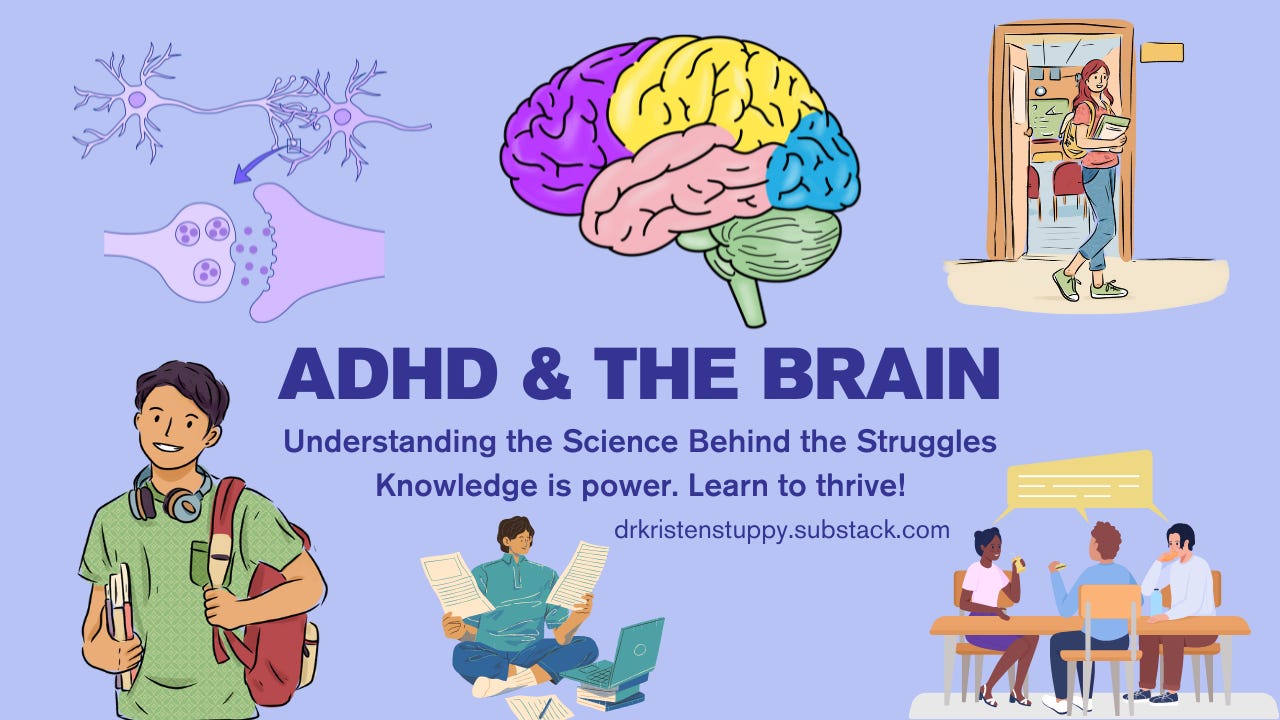ADHD and the Brain: Understanding the Science Behind the Struggles
Knowledge is power. Learn to thrive!
Attention Deficit Hyperactivity Disorder (ADHD) is a neurodevelopmental disorder with a strong biological basis. Despite the substantial evidence, ADHD continues to be a condition that is widely misunderstood and frequently debated.
ADHD impacts the way specific brain regions communicate and manage attention, impulses, and emotions. While any of its symptoms can be experienced occasionally by neurotypical people, the challenges are more consistent in people with ADHD, leading to disruptions in their daily life.
Misunderstanding the brain-based symptoms of ADHD can lead to harmful misconceptions and unfair labels. When ADHD is unrecognized or not fully appreciated, it can lead to the mistaken belief that a person's challenges with focus, organization, or task completion stem from laziness or a lack of intelligence.
People with ADHD may struggle with executive function skills—such as planning, time management, and memory—due to differences in the brain’s prefrontal cortex and neurotransmitter systems. These challenges aren’t a choice or a reflection of effort. Instead, they stem from biological factors that make it harder to manage tasks and stay focused, despite a person's best intentions. Problems can become cyclical as the additional mental effort required to maintain focus can deplete energy, potentially resulting in frustration and reduced motivation.
When others don’t understand this, it can lead to negative labels like “lazy,” when in fact the person may be working much harder just to keep up. Similarly, being called “stupid” can be particularly damaging, as many individuals with ADHD are incredibly bright and capable but may need different strategies to unlock their potential. These labels can erode self-esteem and lead to a cycle of frustration and avoidance, where people begin to internalize the belief that they aren't capable, even when their struggles are tied to ADHD symptoms, not lack of ability.
This is why raising awareness about the brain-based reality of ADHD is so important. When we understand that ADHD is a medical condition affecting the brain, we can replace unfair judgments with support, helping individuals learn the tools they need to succeed. Recognizing these brain-based challenges also allows those with ADHD to focus on their strengths and find ways to thrive, without being held back by misconceptions.
What do we know about the brain science of ADHD?
Brain imaging studies have shown that individuals with ADHD have differences in brain structure and function, especially in the prefrontal cortex. This area of the brain oversees executive functions, including planning, focusing, and controlling impulses. This type of imaging is not used for diagnosing individuals, so do not expect this as part of a diagnostic evaluation. Imaging is used in research to better understand ADHD.
Neurotransmitters—chemical messengers in the brain—also play a key role. People with ADHD tend to have altered levels of neurotransmitters. This imbalance makes it harder for them to stay motivated, follow through on tasks, or maintain focus, which can often be misunderstood as laziness or lack of discipline. It’s also why medications that affect neurotransmitters help to treat symptoms associated with ADHD.
It’s not all bad…
ADHD isn't just about challenges. Many people with ADHD excel in areas that require out-of-the-box thinking, creativity, and adaptability.
With the right understanding and support, they can harness their unique strengths and find success in their own way.
Teens, do you want to learn more?
Whether you're diagnosed, suspect you might have ADHD, or are just curious if ADHD is real, there’s a great opportunity coming up to learn more about the science of ADHD. Knowledge and understanding about the brain differences can be empowering and validating!
I invite teens to join my online workshop, "What's the Show About?"— a 90-minute interactive session designed for teens looking to understand their brains better. It’s one of 10 workshops to help teens learn about ADHD, executive functioning, and emotional regulation.
In this workshop, teens will:
Understand the science behind ADHD and its impact on everyday life
Discover their strengths and weaknesses based on how their brains work
Learn essential tools to manage executive function challenges
Gain self-advocacy skills for school and life
Consider accommodations to support their needs
Following the workshop, teens will be motivated to engage in self-improvement through worksheet exercises. They will also have access to a private online forum exclusive to workshop participants, which will provide continuous learning and support.
Don’t miss this chance to explore your brain and learn how to take charge of your story!





